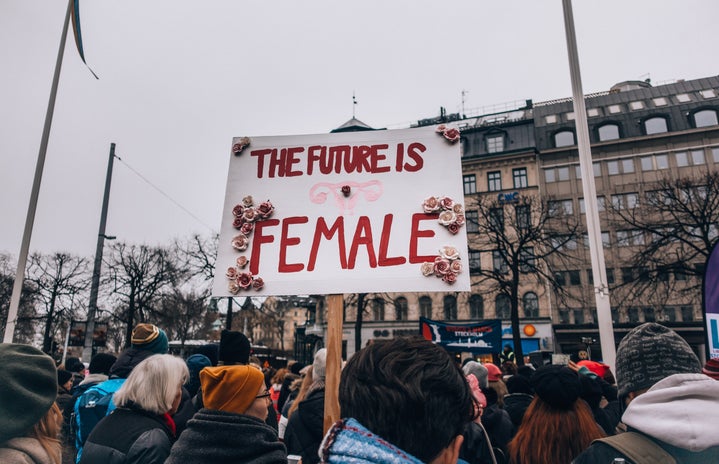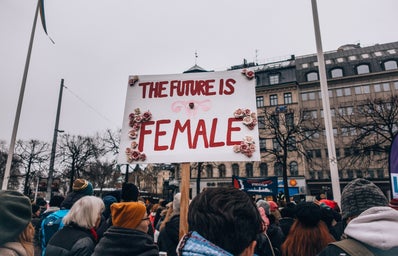What a wonderful thing it is to be a woman.
I’m not entirely sure that you, dear reader, feel the same way about this statement. If that’s the case, and you, as a self-identifying woman, hold some inner bitterness or frustration over being a woman in the world we currently live in, then I hope this article offers you a new perspective, showing you how women are fu**cking awesome, having achieved so much in spite of repressive patriarchal forces. It can be so easy to be blinded by the terrifying reality of the violence and oppression experienced by so many women around the world. Rather than ignoring these experiences, I want to offer a reminder of just how far womankind have come!
Let’s have a quick look at some of the truly awe inspiring events led by women that have contributed to the progression of equal rights. In 1792 Mary Wolstonecraft made history when she wrote A Vindication of the Rights of Women, arguing that women are not, in fact, ‘naturally inferior to men’, but simply deprived of the same educational opportunities. In 1848, Elizabeth Cady Straton and Lucretia Mott led the Seneca Falls Convention in New York, pressing for women’s rights. In 1915 the International Congress of Women (later becoming the Women’s International League for Peace and Freedom) was held in The Hague where the women delegates discussed the preservation of peace during and after wartime. In 1928, after almost a century of brutal suffrage and resilient persistence, women in the UK gained the right to vote in general elections. More recently, in 2017, women marched on Washington in the largest international mass demonstration in support of women’s rights.
All these events, and so many more, have paved the way for women in the Western world to live as freely as we do now. These women fought with all their hearts in order for us to live a more equal life than they did, and there is no denying that they have in many ways been successful!
Women throughout history have been vital catalysts for change politically, but also, and equally as important, socially. The explosion of women’s refuge centres, charities in support of women’s aid, exposure of women in the media and the body positivity movements are all less tangible things that we have gained. Such things as reduced societal expectations to be a mother, and the gradual acceptance of the idea that women have a choice about which direction they wish to lead their lives, are wonderful progressions. Although women still face unattainable expectations, it is becoming increasingly clear that those expectations are set up by the patriarchy, an outdated, oppressive structure that so many people of all genders are trying to break down.
A recurring theme throughout historical literature seems to be the oppression, objectification and abuse towards women. While this may be correct majority of the time, I believe we have the ability to rewrite the narrative of these old stories; rather than reading them through the male gaze, we can praise those female characters for their bravery and divinity in the face of violence and oppression. The poem ‘Godiva’, by Lord Alfred Tennyson, tells the story of the mythical Lady Godiva, who famously rode through her village naked on horseback in order to win a bet with her evil husband and get him to dissolve a new tax he had laid on the people. This story, deliberately read without the male view of sexuality and objectification of the female body, illustrates Godiva as a fearless leader, willingly subjecting herself to intense embarrassment and vulnerability to bring peace back to her people. How brilliant is that!
I will take you back to Medieval times for another example. At some point in the 12th century lived an illusive writer called Marie De France, who wrote many ‘lais’ (French poetry) about women committing all sorts of sexual and romantic ‘sins’, who often get away with it and live life delighting in frivolities. History has painted the medieval period as ruled and written entirely by men, leaving no space for women to be creative, and have their own storylines, but this is a false narrative. I revel in the fact that Marie De France clearly experienced the same lust, desire and pleasure in romance as women still do now, and that she talked about it freely and gloriously!
However, outside the comfortable pages of books, there remains a whole host of problems and issues that are still being fought for. In particular matters of the female body and the expectations of womanhood. The conversation around women’s sexuality, pleasure, desires, and women’s health (particularly menstruation and the menopause), has been stigmatised for so long, and thought shameful to discuss. But another wonderful progression is that every day there is more research being put into both of these things in order to provide women with healthcare and advice that is not based upon male experiments and anatomy, but devised specifically for women. The advancements of birth control and treatments for menopause are only growing, and it thrills me to know that things are being done to improve healthcare for so many women who have been belittled, brushed aside and forced to endure their pain in silence.
Although part of being a woman means you naturally have to deal with periods, sore boobs, weird and taboo questions about how your body actually works, and any number of physical problems, there are a much greater scale of things about being a woman that I personally adore. An example of this is the camaraderie between women and the general sense of looking out for each other in light of all the troubles. A friend of mine recently had her heart played around by a boy she really fancied, and who she thought fancied her back, but this ended up not being the case and another girl, who was basically a stranger, approached my friend and told her that she experienced the same thing with this boy, letting her know that she hasn’t been the only one toyed with. Whilst the circumstances of this situation may have left my friend still feeling upset, what shines through to me is that women have eachothers backs, almost inherently. It’s as if the backdrop of our struggle as a gender has set up womankind to be linked by the common denominator of oppression by the patriarchy. I know that any of my female friends would have my back in a time of trouble, without even questioning the severity of the situation. Women are tied together by struggle.
Another reason I love being a woman is to flip the male gaze in my favour, embracing the sexuality that the patriarchal system enforces on femininity and making it my own, owning it and flaunting it; wielding that objectification as a power, and something I can celebrate about myself. Being ‘womanly’ can mean anything I want it to. I can be a woman who flaunts her femininity, wears makeup and accentuates her female figure, but I can also be a woman who wears baggy jeans, dislikes wearing dresses, and loves to be comfortable. It means I can be graceful and composed, but I can also be wild and aggressive. I can whisper and be polite, and I can shout and swear. I can dance and sing and I can run down a hill or jump into a river. We live in such an age where, for lots of women we are able to do all of these things – live both in the image of the old views of what it means to be a woman, but also live to our own preferences and desires.
Of course it isn’t the same for all women, there are still so many who are trapped and struggling, and it’s easy for me to say all of this as a white, middle-class woman living in London. Coming from this place of privilege I want to use my voice to try and enlighten both myself, and those around me in order to continue to push back against the tidal forces of patriarchy and violence against women all over the world. It is common knowledge that in order to make change in your life, you have to do things you have never done before. This goes for the progression of women’s rights and the move towards equality. If us women never do anything different from what the patriarchy ascribes us, then no change happens. It’s going against the grain, going against things that you disagree with, fighting for your own opinions and rights that really makes a difference, and no difference is too small. Whether you are able to change a dress-code rule in your place of work, propose a new law or idea to a political party, or even to educate those around you, especially young girls and boys, on how far women have come and how to live their life catered to their own ideas rather than those that are socially constructed. Think about the figures you wished you had growing up; the kind of role models you would have liked to have in your life separate from those you already had. Be that role model to someone else. Be the change that you wished to have seen happen in the past.
Being a woman is not something shameful, not something to be pitied. Being a woman means being part of a rich history of fighters, heroes, geniuses, lovers, creatives, rulers, who, against so many odds, have only grown stronger through the continuation of the fight for women’s rights. We keep all these people alive through our ongoing resistance. To those who, at the beginning of this article, disagreed with my statement, I sincerely hope that in reading this you may feel slightly more hopeful or proud about being a woman despite the struggles that you face.
To me, being a woman means to be inspired, to be creative, to be adventurous, courageous, ambitious, resilient, sexy, having a will to take opportunities and challenges by the balls, to be emotional, confident and full of a thirst for life. What does being a woman mean to you?


